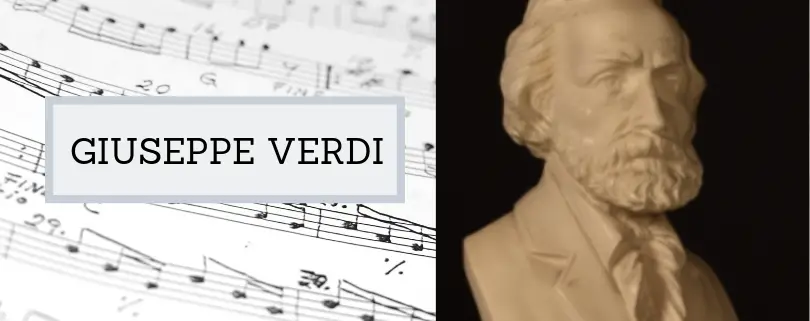Giuseppe Verdi – short Biography
The online opera guide to Giuseppe Verdi
Giuseppe Verdi was the most important Italian composer in the 19th century. He wrote 32 operas. Many of them got world famous, eg La traviata, Aida, Il Trovatore or Otello.
His Life
Verdi was born in 1813 in Roncole, Lombardy. His musical talent was recognized early, but he was denied entry to a conservatory in Milan. He decided to become a private pupil of Lavigna.
First success and life crisis
At the age of 26 he wrote his first opera (Oberto), which was performed at La Scala. After another opera that flopped and the death of his wife and children, the 27-year-old wanted to give up composing.
A sensational success with Nabucco and Giuseppina Strepponi enters in his life
Verdi could be persuaded by the leader of the Scala to write another work and Nabucco was instantly a sensational success. The piece “Va pensiero” became the anthem of the Risorgimento, the Italian striving for freedom. While working on Nabucco he met the singer Giuseppina Strepponi, they fell in love with each other and they decided to live together (to the chagrin of the villagers in a wild marriage). He married her in 1859.
The so called galley years followed Nabucco in which he composed operas regularly and often under time pressure. Many of these works quickly prevailed. These middle years culminated at the beginning of the fifties in the trilogy Rigoletto, Il Trovatore, La traviata.
Member of Parliament and Parisian Years
Verdi was always a politically minded person. He was elected to the Chamber of Deputies. However, he never attended the meetings and soon resigned. He wanted to assert himself in the then opera Mecca of Paris and decided to write operas for the Grand Opéra. He wrote, for example, Les vêpres siciliennes and Don Carlos for the Paris Opera House.
Aida
After this intensive period, Verdi wanted to finally retire to his country estate. But then came the famous request from the Egyptian viceroy to write an opera for the Cairo Opera House. Aida was a great success. He used the money he had won for the further expansion of his estate in Sant’Agata and later for the financing of an old people’s home for opera singers.
Late years
More than 14 years passed since Verdi wrote his last opera Aida, until his publisher Ricordi inspired Verdi to collaborate with the librettist Arrigo Boito. This led to the late works Simon Boccanegra, Othello and Falstaff (the lattest at the age of 86 !), which, like Wagner did, left the classical number opera and aimed at a musical drama. Verdi as well wrote religious works in his late years, though he was not a religious person. His wife died in 1897 and Verdi followed her four years later.
Blog-Links to Verdi’s most famous musical pieces
Aida 1/2
– O patria mia
– Ritorna vincitor (Triumphal march)
– Celeste Aida
Aida 2/2
– O Terra Addio
– Triumphmarsch
– Numi o pietà
La traviata 1/3
– Sempre Libera
– Un di felice etera
La traviata 2/3
– Addio del passato
– Parigi o cara lasceremo
– Di provenza il mar
Nabucco 1/3
– Come notte al sol fugente
– Prode guerrier
– Io t’amava (Terzetto)
Nabucco 2/3
– Tu sul labbro
– Il maledetto non ha fratelli
– Anch’io dischiuso
Nabucco 3/3
– Va pensiero
– Deh perdona
Important topics about Verdi that will be covered in the blog posts:
- Aria e scena
- Verdi Baritone
- Life crisis
- Tritta musicale
- Religiosity



Leave a Reply
Want to join the discussion?Feel free to contribute!